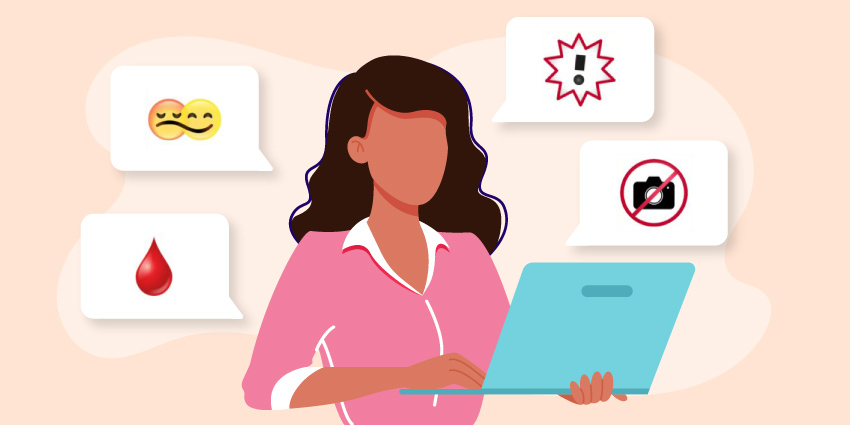Sophia Luu: A period is not an illness – it’s a completely natural recurring cycle

Designer Sophia Luu punched the stigma about periods right in the face. In front of the 11.000 colleagues on Slack, she confessed she is on her period, in pain and is having trouble working efficiently. Instead of “pointing fingers”, people around the world greeted her action and openness. They accepted the new era of publicly speaking about periods, no matter where you are: at home, at work, on the internet, everywhere… Read more in the text below.
There is always that person that makes an idea revolutionary. This time, or rather, earlier this year the world was shaken up by former McKinsey & Company designer Sophia Luu who was tired of being silenced about menstruation and all the pain and mood swings it causes. She was tired of suppressing the biological thing hidden behind the stigma, so she used the blood drop emoji in her Slack status to indicate she was on her period. This reached out to her eleven thousand colleagues. The emoji, single and small but yet so powerful was shared on LinkedIn and became viral. This little red drop prompted a conversation that has been silenced for too long.
What happened later was history… Flo, the leading female health and wellbeing app with evidence-based information from 80+ medical experts, launched a set of four menstruation-related Slack emoji’s to empower people to talk openly about periods in the workplace. Emoji’s, that are available for download on Slack, represent a variety of symptoms and feelings before, and during their cycle – “On My Period”, “Not my Day”, “Camera Off Day” and “In Pain.”
Intimina is trying to break down prejudices about periods for years, so we immediately welcomed and supported this action. Our company is globally known for its period-friendly policy, campaigns and activities, but now we will also be known for freedom of expression about period. Everybody has a right to feel weak while menstruating, so we downloaded emojis to our Slack and invited everyone in the company to use them.
“We believe that open dialogues about menstruation as a normal bodily function needs to exist in all cultures and social spheres, from families and schools to workplaces, and that is why we happily support Flo’s initiative. It is completely acceptable for menstruators not to feel their best while bleeding and many studies have proven that menstruation affects productivity. To acknowledge that, Intimina has implemented a period-friendly policy which allows its employees to have working flexibility during menstruation”, explained Danela Žagar, Intimina’s global brand manager. Inspired by her words and all the amazing things that Flo and Intimina did for the whole world, we searched for the most important person in this chain – Sophia Luu, and invited her to answer a few questions for our blog.
Earlier this year, the fact that you used the blood drop emoji in your Slack status turned out to be breaking news that went viral. Can you tell us how you came up with the idea to share information about your period and what were your expectations from this action? And how did you felt when your blood drop emoji became the most talked about topic?
To be honest… I’m really surprised this wasn’t already a thing, it just felt very intuitive for me to do. I had just come back from being sick and then my period started. I had a lot of male colleagues in my team who had not experienced a period before and I didn’t feel comfortable opening up verbally in this environment. I used the simple ‘Red blood drop emoji’ and set it as my status to make people aware that there was a reason why I was being extra slow and having to leave meetings early. To me, disclosing that I’m on my period is necessary information as I get very severe cramps and nausea. It’s not an illness – it’s completely natural and it comes back every month and so my teams need to know! I understand though that not everyone will feel the same way about sharing and that’s completely fine too.
I felt like this was way beyond me now. This was about the experience of millions of people who have periods all the time and the struggles they can have in the workplace.
Menstruation in the workplace has always been taboo and something women could not talk about openly with their colleagues. Do you think anything is changing on that front and what steps do you think employers should take to create a more understanding and empowering environment for employees who menstruate?
The first thing to highlight – but it’s not just women who have periods! Men who are trans and non-binary people can have periods too. Women who are trans can also experience PMS and other symptoms. As a cis-woman myself, I can’t speak for these experiences, but I can imagine it can be isolating for lots of people to talk about periods in different ways.

Changes in the workplace vary in the workplace in question. Some smaller grassroots organizations are much more forward-thinking in their approach, whereas I’ve heard horror stories from people in other industries who feel like they can’t be open.
Talking about periods is therefore a part of feeling like you can bring your whole self to work. I am a huge advocate of bringing your whole self to work. It’s the best way to feel accepted, confident and to ultimately perform better and more creatively at work. But sadly, it’s not easy to do, especially if you are different to everyone else you work with. Any organization wishing to be more inclusive to periods needs to also think about who feels comfortable to ‘bring their whole self to work and who doesn’t. It is about questioning what taboos already exist, where they came from and whose assumptions are taken as ‘facts’ for how to be professional. This expands way beyond periods, but also chronic pain, being a parent, having long term morbidity, bad news in the family and many other personal reasons which affect your ability to do your job well.
You have collaborated with the Flo app to design three menstruation-related Slack emoji’s. What will these emoji’s be communicating and how will they help menstruators feel more empowered?
Absolutely! Our aim here is to use emoji to create a standardized language to communicate when you are on your period or need to slow down to navigate the ups and downs of your cycle. Beyond this, we hope that they empower everyone to raise awareness and encourage more open period talk in the workplace.
We have tried to cover a range of ‘practical’ elements of your day which would make it easy for colleagues and employers to know how best to help you. Alongside a ‘period status’ which we made using the iconic red blood-drop emoji, we also made:
“Not My Day”, for moments where hormones or PMS are affecting you; “Camera off Day”, for when you don’t want to show your face but still be present in meetings; “In Pain and Need a Break”, for when you need to step away from work due to pain.
We also created a guidebook for everyone to understand what is meant by these emojis, and how to open up conversations about periods in a thoughtful and non-interrogative way.
You have created an award-winning “Everybody Bleeds” video dedicated to fighting period stigma and ending period poverty and the period product taxation. Tell us more about the campaign and why it is important.
In a sentence, “Everybody Bleeds” is a set of plasters shaped like sanitary pads. Both sanitary pads and plasters do the same thing: soak up the blood. But one is taxed and the other isn’t. It’s one of the many examples of how period stigmas are affecting global wellbeing and body confidence. This campaign concept uses the plaster as a visual metaphor to get those who don’t have periods to better understand the sight and experience of menstruation.
I started designing the concept for “Everybody Bleeds” as part of an “End Period Stigma” brief set by D&AD. Winning that competition is what got me hired at McKinsey – so maybe I’m just typecast as “The Period Girl” now!
You can see more about the campaign design here.
Do you have open conversations about menstruation with your family, your partner or your colleagues at work? From your experience, do you feel people are today more open to having such conversations?
I have always been lucky to be able to communicate when I am on my period with all the important people in my life. My partner Tig, my dad, my granddad… they are all incredibly supportive and know how to help me through this time. What surprised me was how little this was the case in the workplace. Maybe it’s because I’m new to the world of full-time, 5-days-a-week ‘professional’ employment, but I observed that a lot of personal conversations had been muted in a lot of workplaces. The small talk felt very surface level, and a lot of interactions can be very transactional. It is easy to see how working for many years in traditional workplaces can make you feel uncomfortable to change this. With a new generation coming into the world of work, we need to change this – especially as conversations are starting to open up more generally.
What would you advise people who menstruate to do to contribute to ending period stigma in the workplace? What small steps can each of us take to help the cause?
The real way to target period stigma in the workplace? Target those who DO NOT menstruate! I have found that a lot of people menstruating are generally quite comfortable talking about their periods with each other, but less so with people who don’t have periods. It’s all about creating a space where people feel comfortable to open up, disclose whatever they feel is relevant to know about them doing their job and redefining the notion of “professionalism” to include all experiences of work.

A collective group of “lady experts” at Intimina who love sharing our personal experiences, even when they are a little too personal. We believe it’s time to start breaking down the taboos around menstruation, motherhood, and menopause, and start owning our female health.


